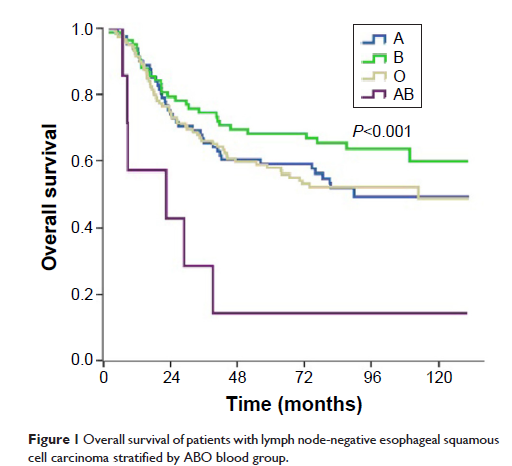109669
论文已发表
注册即可获取德孚的最新动态
IF 收录期刊
- 3.4 Breast Cancer (Dove Med Press)
- 3.2 Clin Epidemiol
- 2.6 Cancer Manag Res
- 2.9 Infect Drug Resist
- 3.7 Clin Interv Aging
- 5.1 Drug Des Dev Ther
- 3.1 Int J Chronic Obstr
- 6.6 Int J Nanomed
- 2.6 Int J Women's Health
- 2.9 Neuropsych Dis Treat
- 2.8 OncoTargets Ther
- 2.0 Patient Prefer Adher
- 2.2 Ther Clin Risk Manag
- 2.5 J Pain Res
- 3.0 Diabet Metab Synd Ob
- 3.2 Psychol Res Behav Ma
- 3.4 Nat Sci Sleep
- 1.8 Pharmgenomics Pers Med
- 2.0 Risk Manag Healthc Policy
- 4.1 J Inflamm Res
- 2.0 Int J Gen Med
- 3.4 J Hepatocell Carcinoma
- 3.0 J Asthma Allergy
- 2.2 Clin Cosmet Investig Dermatol
- 2.4 J Multidiscip Healthc

已发表论文
血型对中国食管鳞状细胞癌患者存活率的影响
Authors Qin J, Wu SG, Sun JY, Lin HX, He ZY, Li Q
Published Date April 2015 Volume 2015:8 Pages 947—953
DOI http://dx.doi.org/10.2147/OTT.S81936
Received 31 January 2015, Accepted 18 March 2015, Published 23 April 2015
Background: The aim of this study was to evaluate the prognostic value of ABO blood
group in Chinese patients with esophageal squamous cell carcinoma (ESCC) after
esophagectomy.
Methods: This study was a retrospective review of the records of 548 patients with ESCC who received cytoreductive surgery between October 2002 and March 2007. The prognostic impact of ABO blood group on overall survival (OS) was analyzed.
Results: The median follow-up time was 37 months, and the 5-year OS was 43.3%. The overall 5-year OS was 41.2%, 49.7%, 44.0%, and 29.8% for the A, B, O, and AB groups, respectively (P =0.038). Among patients with negative lymph nodes (LNs), the 5-year OS was 59.0%, 68.2%, 57.9%, and 28.6% for the A, B, O, and AB groups, respectively (P <0.001), but blood type had no value in predicting the OS of patients with positive LNs (P =0.524). In multivariate Cox regression analysis of all patients, ABO blood group was not an independent prognostic factor of OS. However, in patients with negative LNs, blood type was an independent prognostic factor of OS, and the higher risk of death for patients of type AB versus non-AB significant in multivariate analyses (hazard ratio [HR], 2.576; 95% confidence interval [CI], 1.349–4.919; P =0.004).
Conclusion: ABO blood group is associated with survival in Chinese patients with ESCC. Patients with blood type AB had a significantly worse OS than patients with non-AB type, especially in patients with negative LNs.
Keywords: esophageal squamous cell carcinoma, ABO blood-group system, prognosis, lymph node, survival
Methods: This study was a retrospective review of the records of 548 patients with ESCC who received cytoreductive surgery between October 2002 and March 2007. The prognostic impact of ABO blood group on overall survival (OS) was analyzed.
Results: The median follow-up time was 37 months, and the 5-year OS was 43.3%. The overall 5-year OS was 41.2%, 49.7%, 44.0%, and 29.8% for the A, B, O, and AB groups, respectively (P =0.038). Among patients with negative lymph nodes (LNs), the 5-year OS was 59.0%, 68.2%, 57.9%, and 28.6% for the A, B, O, and AB groups, respectively (P <0.001), but blood type had no value in predicting the OS of patients with positive LNs (P =0.524). In multivariate Cox regression analysis of all patients, ABO blood group was not an independent prognostic factor of OS. However, in patients with negative LNs, blood type was an independent prognostic factor of OS, and the higher risk of death for patients of type AB versus non-AB significant in multivariate analyses (hazard ratio [HR], 2.576; 95% confidence interval [CI], 1.349–4.919; P =0.004).
Conclusion: ABO blood group is associated with survival in Chinese patients with ESCC. Patients with blood type AB had a significantly worse OS than patients with non-AB type, especially in patients with negative LNs.
Keywords: esophageal squamous cell carcinoma, ABO blood-group system, prognosis, lymph node, survival
